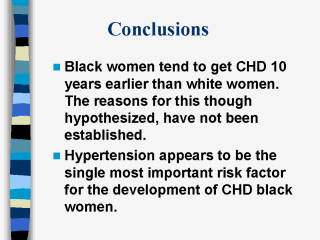 |
Given the ARIC finding that CHD
is particularly prevalent in African American women under the age of 54, it is possible
that the mechanisms of CHD as well as the relative roles of risk factors are different in
African American women. Clearly, exploration in to the potentially unique biological
explanation of CHD in African women is warranted and possibly long overdue. Much research
is also needed in to the complex relationship between behavior and prevention of CHD in
African Americans, especially African American women. Although reduction in risk factors
has been shown to be an effective prevention strategy for the general population, studies
that outline the efficacy of prevention strategies in African Americans are minimal. To
date, results of large scale studies that included either whites or men only tend to be
generalized to African American women. Given the biological and cultural differences that
have to date been identified in this group, research in to culturally validated
instruments for data collection as well as health-care seeking behaviors are priority
areas. In view of the fact the high incidence of CHD in African American women is highly
related to the prevalence and co-morbidity of traditional risk factors, this group is
quite likely to derive substantial benefit from well designed prevention strategies. |
